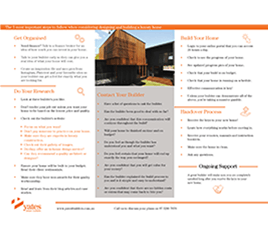Once you have done your research and decided on which builder you want to build your custom luxury home, the next step to take is to sign a contract with them.
A building contract is equally as important to the success of your build as is the design, plans, craftsmen and materials used to build your home.
Without a doubt the most common mistake made by people when entering a legally binding building contract is, they don’t read it and fully understand it properly.
When building your luxury home, you want everything to run smoothly and on budget but when it comes to a building contract, the parts that most commonly catch people out relate to costs.
Even though you might be signing a so called ‘fixed price’ contract to build your home, with some builders that doesn’t mean the price you are signing for is guaranteed. Why? Well it’s all comes down to two terms used in building contracts called ‘Provisional Sums’ and ‘Prime Costs’.

If you have followed my previous recommendations of researching your builder thoroughly prior to signing a contract with them, then your builder should have already taken the time to understand all the selections you want in your new home. These should be fully itemised and included with your building contract, and your builder should carefully look over these with you one more time prior to signing, to ensure that the cost for your home includes all that you want in it. The only other things you need to be aware of that could potentially blow your building contract budget are referred to as Provisional Sums and Prime Cost items.
So, let’s have a closer look at these rarely understood terms:
A Provisional sum is an estimate of what it will cost to do an aspect of the job, when it’s not possible to know the precise cost beforehand. For example, if a site has to be excavated, it’s not always possible to know what the excavators may find beneath the surface. If it’s rock, this may result in more extensive excavation and therefore more cost.
You could imagine how much a provisional Sum could change on a large site! Tens of thousands of dollars before the house even starts!
A Prime Cost item is a budget assigned to products or items for the build, such as $15,000 for stone tiles or $10,000 for taps. A Prime Cost item allows a budget to be made without needing to know the exact style, brand and model of the item straight away. In other words, we’re talking about best guesses here.

While builders are legally obliged to try to be as accurate as possible, and some are, there are some things you need to know about these contract terms.
Firstly, to secure the contract and get you to sign with them, a builder may try to make their quote as low as possible early on. Sadly, in this case, the risk and cost of being caught out is high. If your builder hasn’t bothered to invest the time with you right at the start to go through and select every single item you want in your home such as tapware, light fittings, floor coverings etc, then it’s possible that there will be a substantial list of Prime Cost items in your contract.
When it’s time for those taps to be installed in your home, suddenly you may realise that what the builder had budgeted for in the prime cost items section of your contract in order to keep your contract price low and appealing is nothing like the quality, brand or design that you expected or wanted in your home.
What do you do, leave the inferior taps or hand over another $20,000 for the actual taps you originally wanted?
And when you consider that floor coverings, light fittings, toilets, sinks, light switches, appliances etc could all be itemised in the contract under this term, it’s now evident that the items the builder budgeted for and included in your contract price were nothing like the quality you were expecting and you will now have to pay the difference. But not only will you have to pay more for your home than you expected, you also now have the stress if the items you do want are not immediately available … what happens then? Well that’s a whole other can of worms which I’m not going to go into here. But these things all need to be considered, prior to you signing your contract!
Same thing with Provisional Sums. Things like earthworks are sometimes tricky to quote depending on the site and access so in rare cases it’s necessary to have this listed here as until the builder starts excavating, they don’t know what’s underneath the ground. The problem with provisional sum items is that some builders include very large costs like scaffold, windows, cabinetwork, carpentry and other large parts of the build under this section in the contract. Now I’m not saying that all builders are dishonest, but there are some who are and so if they have been dishonest and under-quoted on purpose for this cost of the build in order to keep the contract price low and win the job, then it’s highly likely that they haven’t made enough allowance here and they will be making you pay the difference.
Can you now see how if you’re not prepared or you’re unaware of what to look for in your contract, these things can really bite you? You’ll either suffer massive budget blowout or if you simply cannot pay more money, you’ll end up with inferior quality products, materials and workmanship in your home.
That’s why we are consistently committed to educating you on these things through these blog articles and videos. So, once you know, there is no excuse for not thoroughly reading, reviewing and revising your contract before you sign it, to make sure that you fully understand what everything means. And if you don’t understand something, then ask your builder and get them to explain it to you until you do.
If you’re ready to begin the exciting journey of building your very own luxury custom home, then feel free to check out our amazing all-inclusive luxury home design range here.




